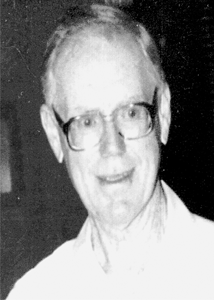1997 Recipient of the Arthur T. Potts Award

Dr. Robert Fullerton Leyden
Robert F. Leyden received his Bachelor of Science in Agronomy from New Mexico State University in 1952. In 1953, Robert graduated from Kansas State University with a Master of Science degree in Soil Fertility. After receiving his Doctorate in Soil Chemistry from Rutgers University in 1956, Robert came to Texas A&I University Citrus Center in Weslaco as an Assistant Professor in Soil Science and Citrus Nutrition. He attained the academic rank of Full Professor in 1967, and after 28 years of highly innovative and productive research and untiring dedication to the Texas Citrus Industry and Citrus Center, Dr. Robert Leyden retired in 1984.
On a personal note, Robert F. Leyden was born in Glasgow Scotland and at a very young age immigrated with his parents to the United States. He grew up and attended schools in New York City. Robert served in the Navy and was a decorated veteran of World War II. In 1948, he married his beloved Betty Easterday and they had three children (and 5 grand children)—Darlene (Lott) who with her husband Jerry and two sons, Marshall and Matthew, reside in Weslaco;—Steven Leyden (wife deceased) and son, Robert Leyden, reside in Oak Harbour, Washington–and Denise (Harbison) who with her husband Steve and two daughters, Heather Yee and Melissa, reside in Goleta, California.
Many of the accepted and commonly used grove management practices and procedures are a result of Dr. Leyden’s research and extension program at the Center. For example, he conducted extensive testing of pre- and post-emerge herbicides and essentially pioneered the chemical weed control program in citrus; strongly advocating its importance in freeze protection. He determined the nitrogen requirements for citrus i.e., a mature producing citrus tree essentially needed one pound of actual nitrogen per year. He also studied minor element requirements, particularly zinc, manganese and phosphorous, and the tree responses to their use.
Dr. Leyden was a strong proponent of scheduling and timing orchard irrigations based on careful and repeated monitoring of soil moisture levels. He also did considerable research on alternatives to flood irrigation generally used in Texas orchards viz., testing methods like drip irrigation and micro-jet irrigation. He advocated the use of these alternative irrigation methods for water conservation and the latter for freeze protection.
Dr. Leyden also researched many freeze protectant devices including: diesel-fueled return stack heaters, petroleum-coke heat blocks, and several different types of tree trunk wraps like fiber glass or “rock-wool” and polyurethane. The polyurethane protectant trunk wraps are now widely used on young trees for the first few years after planting in the orchard. He also studied other aspects of freeze control and established that heat inversions occur in the Lower Rio Grande Valley, and during a radiational freeze it is often several degrees colder on the orchard floor than at the 60 ft level. As a result, many Valley and Citrus Center orchards were equipped with wind machines to force air movement during a radiational freeze.
Dr. Leyden always made himself available to the citrus grower, answering inquires and making extension visits to help solve problems associated with nutrition, soil, weed and water management in their orchards. He was a frequent speaker and participant in Industry meetings and workshops, and regularly taught continuing educational courses given at the Citrus Center. He made regular appearances on Bob McDonald’s KRGV-TV Farm Show and Charlie Rankin’s Farm Show on KURV radio. He also attended professional meetings and symposia, often as an invited speaker. For example, he presented an invitational paper on– “Development of the herbicide weed control program on Texas citrus,” at the First International Citrus Symposium held at the University of California, Riverside in March 1968.
Lastly, Dr. Leyden was a strong and dedicated supporter of the Rio Grande Valley Horticultural Society. He served for seven years as Editor-in Chief of the Horticultural Journal and always maintained very high standards for published articles. If submitted articles were not returned promptly by reviewers, he was quick to retrieve and send them onto another reviewer so that publication deadlines were met.. He was also responsible for several Journal changes, for example the inclusion of quality “popular” articles in the Journal. Journal covers always featured photographs and drawings that had “eye appeal” and drew attention to the Journal and the papers published therein. Dr. Robert F. Leydens’ many accomplishments, contributions and long service benefitted not only the Rio Grande Valley Horticultural Society, but all those with whom he came in contact and were privileged to know him.